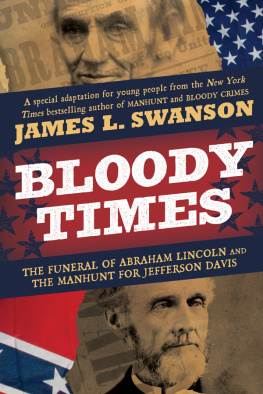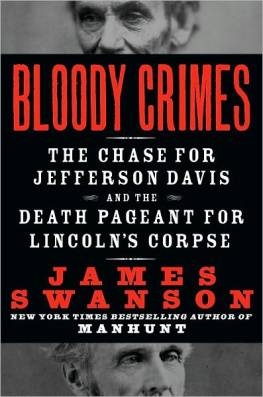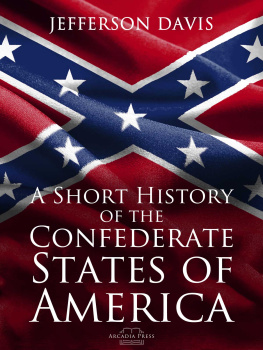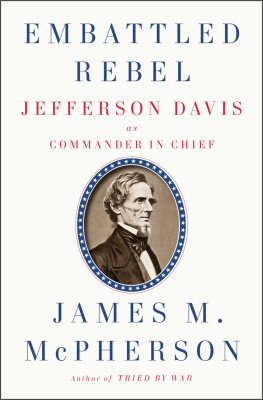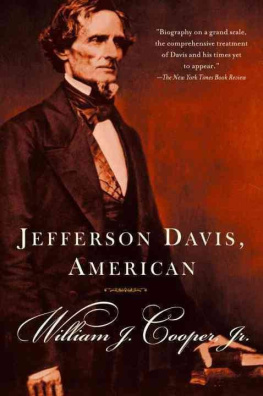JEFFERSON DAVIS,
NAPOLEONIC FRANCE,
AND THE NATURE OF
CONFEDERATE IDEOLOGY
1815-1870
CONFLICTING WORLDS
New Dimensions of the American Civil War
T. Michael Parrish, Series Editor
JEFFERSON DAVIS,
NAPOLEONIC FRANCE,
AND THE NATURE OF
CONFEDERATE IDEOLOGY
1815-1870
JEFFREY ZVENGROWSKI
LOUISIANA STATE UNIVERSITY PRESS
BATON ROUGE
Published by Louisiana State University Press
Copyright 2019 by Louisiana State University Press
All rights reserved
Manufactured in the United States of America
First printing
Designer: Barbara Neely Bourgoyne
Typeface: Adobe Garamond Pro
Printer and binder: Sheridan Books
Library of Congress Cataloging-in-Publication Data
Names: Zvengrowski, Jeffrey, 1985 author.
Title: Jefferson Davis, Napoleonic France, and the nature of Confederate ideology, 18151870 / Jeffrey Zvengrowski.
Description: Baton Rouge : Louisiana State University Press, [2019] | Series: Conflicting worlds : new dimensions of the American Civil War | Includes bibliographical references and index.
Identifiers: LCCN 2019014119 | ISBN 978-0-8071-7067-0 (cloth) | ISBN 978-0-8071-7230-8 (epub) | ISBN 978-0-8071-7229-2 (pdf)
Subjects: LCSH: Davis, Jefferson, 18081889Political and social views. | Napoleon III, Emperor of the French, 18081873Influence. | BonapartismSouthern States. | White supremacy movementsUnited StatesHistory19th century. | SlaveryUnited StatesHistory19th century. | Southern StatesPolitics and government17751865. | Confederate States of AmericaPolitics and government. | United StatesHistory
Civil War, 18611865.
Classification: LCC E467.1.D26 Z84 2019 | DDC 973.7/13092dc23
LC record available at https://lccn.loc.gov/2019014119
The paper in this book meets the guidelines for permanence and durability of the Committee on Production Guidelines for Book Longevity of the Council on Library Resources.

To Em and our children
CONTENTS
JEFFERSON DAVIS,
NAPOLEONIC FRANCE,
AND THE NATURE OF
CONFEDERATE IDEOLOGY
1815-1870
INTRODUCTION
Stating in 1857 before a boisterous Jackson, Mississippi, crowd that the 1856 election was known to be between democracy and the black republicans, Mississippi U.S. senator Jefferson Davis claimed that Democrats and particularly his southern Democratic supporters had prevented treasonous Anglophile Republican abolitionists from perverting the federal government to impose inequality among whites and racial equality across the Union. The United States [g ] randly passed... through that most terrific of all our crisis [sic], he boasted, and where is that man who does not know... that the southern democracy saved the Union of equal rights? Davis inherited a political tradition tracing back to so-called War Hawks among the Jeffersonian Democratic-Republicans, whose party came to be known as the Democratic Party or simply the Democracy after the War of 1812. He and his supporters held that the 1787 Constitution established a federal government that was not supposed to encroach upon rights reserved to the states but had been delegated extensive military-related powers that states were not to deny. Protecting what they took to be the correct nature of the U.S. federative system against both northern Republicans and southern states rights extremists loosely affiliated with their own party, Davis Democrats called themselves conservatives because they aimed to preserve what they thought was the true nature of the American nation, which had been forged in battle against Britain during the Revolution of 1776. That nation was characterized for them by the mutually reinforcing principles of equality among whites and white supremacy, by Jeffersonian democracy defined in opposition to British abolitionist elites espousing white inequality as well as racial equality. And they believed that the American nations destiny was to wage a new War of 1812 to conquer Britains Union-surrounding empire in the Americas.
Mindful of events across the Atlantic, Davis Democrats also recalled that Bonapartists had been de facto U.S. allies during the War of 1812. Daviss mainly but not entirely southern War Hawk Democrat progenitors viewed Daviss namesake Thomas Jefferson, the first Democratic president, as an ideological and strategic ally of Napoleon Bonaparte (Napoleon I) against Britain, which had, as Jefferson stated in the Declaration of Independence, excited domestic insurrections amongst us, and... endeavoured to bring on the inhabitants of our frontiers, the merciless Indian Savages, whose known rule of warfare, is an undistinguished destruction, of all ages, sexes and conditions. They believed that Bonaparte aimed to forge a United States of Europe that would destroy feudalism and spread equality among whites across the continent in emulation of the Union in North America. And they looked forward to the United States and Napoleonic France displacing or subjugating nonwhites for the benefit of whites, fulfilling what they saw as the purpose of the American and French Revolutions by imposing white equality and supremacy on both sides of the Atlantic. Britain, however, stood in the way. Daviss South Carolinian mentor John C. Calhoun and his pro-Bonaparte War Hawk supporters accused the British Empire of helping advocates of white inequality oppose the United States and Bonapartist France, both of which they regarded as beset by rebellious nonwhites whom British abolitionists were inciting with promises of racial equality. They thus gladly turned the Union into a de facto ally of Napoleonic France in 1812 by impelling the United States into war against the British and their nonwhite allies, whom Bonapartists and pro-Bonaparte Democrats regarded as brutish racial inferiors. The Union, however, could not conquer British North America while France failed in Saint Domingue (Haiti) and Europe, leaving Calhoun to keep the pro-Bonaparte Democratic tradition alive throughout the vexing interregnum between the two French emperors.
Davis Democrats accordingly celebrated when Bonapartists with similar ideological commitments to white equality and supremacy came to power in France under Louis-Napoleon Bonaparte (Napoleon III). They cheered again a few years later when Davis became secretary of war in 1853 under the Democratic president Franklin Pierce. And they exulted in 1857 when Davis likened them at Jackson, which was named after the Democratic War of 1812 hero Andrew Jackson, to the elite Imperial Guard within the Grand Arme of Napoleon I: Yes, in that appalling emergency, when all we hold dear was jeopardized, they stood like the old guard of Napoleon, with the inscription written upon their brows, the old Guard knows how to die, but never surrenders!
Secretary of War Davis acquired such advanced military technology as the mini ball from Napoleon IIIs France, with which his efforts to forge an antiabolitionist alliance against Britain were being jeopardized in his view by treasonous Anglophile factions in the United States hostile to white equality and supremacy. Those factions were, he believed, descended from the New England Federalists and southern Old Republicans who opposed the War of 1812 as anti-Bonaparte enemies of Calhoun, whose papers were compiled in the mid-1850s by War Department clerk and former Calhoun secretary Richard K. Crall.
By underscoring the rise of Anglophile sentiment among antebellum northerners and especially northern Whigs, historians have neglected the persistence of hostility to Britain among northern Democrats, who often agreed with Davis that many northern Whig Anglo-Saxons were un-American traitors.




